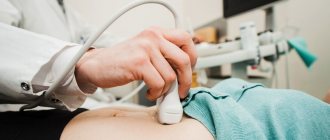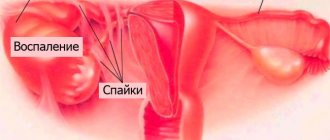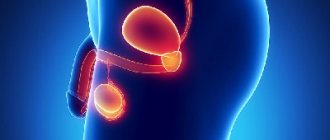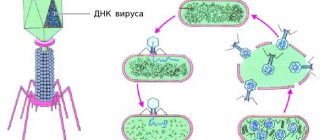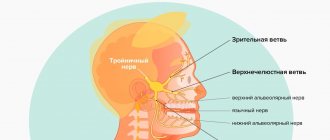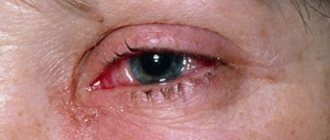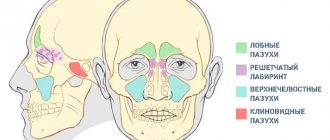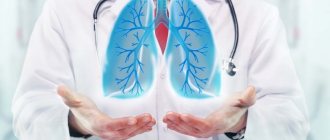Home » Services for women » Gynecology » Inflammation of the appendages in women
Adnexitis is the name given to inflammation of the fallopian tubes and ovaries. The disease often occurs in women after thirty, as well as in women who frequently change sexual partners. In the absence of therapy, inflammation of the appendages in women has sad consequences - infertility, associated diseases of the genital area or oncology. Therefore, if symptoms characteristic of the inflammatory process occur, you should immediately visit an experienced gynecologist and consult with him.
Causes
The appendages become inflamed under the pathological influence of cocci (streptococci, staphylococci, gonococci), Escherichia coli, Koch bacillus (mycobacterium tuberculosis), actinomycetes (radiant fungi). Koch's bacillus, a pale spirochete, enters the tubes and ovaries from infected organs through the bloodstream. This route of infection is called hematogenous. The remaining bacteria penetrate the appendages along the ascending path.
The vagina is inhabited by opportunistic microorganisms. When certain factors appear, they become pathogenic, causing adnexitis. Pathagents penetrating from outside displace beneficial microflora from the vaginal area. Bacteria spread along an ascending path, reaching the tubes and gonads, leading to their inflammation and corresponding symptoms. Pathogens can also be carried through the lymphatic system.
Provoking factors:
- promiscuity in intimate partners, their frequent change;
- sex without a barrier contraceptive. A regular partner may not be sick himself, but may be a carrier of the infection. If a woman has a weak immune system and/or menstruation, she will most likely become infected;
- STD;
- stagnation of blood in the pelvis caused by irregular sexual intimacy, physical inactivity, obesity, constipation;
- tuberculous damage to any organ;
- chronic infectious process in the absence of treatment during relapse (tonsillitis, caries, sinusitis, bronchitis, cystitis, endometritis, vulvitis, vaginitis, others);
- low immune status, susceptibility to frequent colds;
- long-term antibiotic therapy;
- having sex during menstruation. Through the open cervical canal with regulation, microorganisms easily penetrate into the appendages, causing inflammation;
- stress negatively affects the production of hormones;
- severe illnesses that weaken the body;
- lack of treatment for urogenital infections;
- hormonal imbalance;
- unsuccessfully installed IUD. The intrauterine contraceptive itself is not the cause of salpingoophoritis, but it aggravates the course of the pathological process. Therefore, before treatment, the IUD is removed;
- regular physical fatigue;
- constant diets, fasting, as a result - vitamin deficiency, deficiency of microelements;
- ignoring hygiene procedures;
- using other people's towels, napkins, linen for hygiene;
- improper hygiene when the pathogen is introduced from the intestines;
- swimming in open water, especially during menstruation;
- intimacy after surgical treatment, when the gynecologist’s recommendations are not followed;
- surgical interventions on the reproductive organs;
- childbirth, especially complicated ones;
- invasive diagnostic procedures.
Pregnant women are less at risk of inflammation of the appendages. This is due to changes in the composition and quality of cervical mucus. During pregnancy, it thickens, performing a barrier function, trapping bacteria. If a woman has chronic adnexitis, then a relapse is possible. This is explained by intense hormonal changes during the gestational period.
Intimate hygiene
During treatment, it is important to follow the rules of intimate hygiene: wash with warm water using a care product that has a physiological pH level. Gynocomfort washing gels for intimate hygiene are suitable for this purpose. It gently cleanses the vaginal mucosa without disturbing its natural acidity, and has an antimicrobial and anti-inflammatory effect. This product, like other Ginocomfort gels, is suitable for regular use, and also has the entire package of necessary documents and quality certificates.
Sources:
- CHANGES IN THE VAGINAL MICROFLORA AND THE POSSIBILITY OF THEIR IMMUNOLOGICAL CORRECTION IN PATIENTS WITH CHRONIC SALPINGOOPHORITIS. Kazhina M.V., Zhmakin A.I., Titov L.P. // Journal of Grodno State Medical University. – 2004. – No. 4. – pp. 58-61.
- CHRONIC RECURRENT SALPINGOOPHORITIS: CURRENT STATE OF THE PROBLEM. Hamadyanova A.U. // Medical Bulletin of Bashkortostan. – 2013. – No. 3 – P.123-130.
- The use of structural resonance therapy in the rehabilitation treatment of patients with chronic salpingo-oophoritis. I.V. Bezbakh // Journal of the Russian Society of Obstetricians and Gynecologists. – 2006. – No. 3. – P. 26-28.
- Immune and reparative therapy in the complex treatment of inflammatory diseases of the genitals in women. V.N. Serov [etc.] // Issues of gynecology, obstetrics and perinatology. – 2010. – T.9, No. 2. – pp. 57-63.
- Inflammatory diseases of the uterus and appendages / B.I. Medvedev [and others]. - Chelyabinsk. - 2001. - P. 278.
- https://poliran.ru/ginekologija/lechenie-vospalenija-pridatkov/
- https://medicalj-center.info/diseases/gynecology/inflammation-of-appendages-in-women-symptoms-and-tre…
- https://paper.researchbib.com/view/paper/15477
- https://medicineinfo.net/inflammation-of-appendages-causes-symptoms-treatment.html
- https://en.med-directory.com/vospalenie-pridatkov-u-zhenshhin_default.htm
Classification
Inflammation of the appendages is classified as follows:
| By localization | With the flow | By pathogen type |
| Left-handed | Acute – abrupt onset, severe symptoms. Recovery in a few days | Bacterial – caused by different groups of bacteria |
| Right-handed | Subacute – lasts several days or months | Fungal – the cause is a fungal infection |
| Two-way | Chronic – occurs if acute inflammation is not treated. Characterized by an undulating course, unexpressed symptoms |
Using candles
Vaginal suppositories for inflammation of the appendages
In gynecology, suppositories are actively prescribed to treat inflammation. This is explained by a fairly quick effect, noticeable after several applications of vaginal or rectal suppositories. Rectal suppositories usually have analgesic and anti-inflammatory effects, while vaginal suppositories produce an antibacterial effect.
Signs of inflammation of the appendages
In 2/3 of patients there is an acute onset. In 1/3, the disease begins “sluggishly”, with “erased” symptoms, characteristic of many genitourinary infections.
The acute stage is characterized by:
- cramping or nagging severe pain in the lower abdomen or only on the affected side. Pain increases during coitus, lifting weights, and playing sports. Irradiation to the lumbar region and anus is noted. This is the main symptom of the pathology;
- fever 38 degrees or higher;
- joint, headache, muscle pain;
- sweating, weakness;
- cardiopalmus;
- dyspeptic disorders due to intoxication;
- severe vaginal itching, which intensifies during urination, after sex, and hygiene procedures with soap. A burning sensation in the vagina is another characteristic manifestation of inflammation;
- frequent urination;
- problems with the menstrual cycle. Regulations may increase or, on the contrary, become scarce. The regularity of the cycle is disrupted;
- bleeding outside the cycle;
- when the process is started, an unpleasant odor from the genitals and purulent-serous discharge appear.
With chronic inflammation of the appendages, an asymptomatic course is often observed.
May occur:
- unexpressed periodic aching pain;
- painful sex and bowel movements;
- non-cyclic bleeding;
- mucous vaginal discharge;
- unpleasant odor that increases during menstruation;
- Lack of treatment leads to cycle disruption. With purulent inflammation, amenorrhea sometimes occurs;
- low-grade fever during relapse.
Pain syndrome worsens the quality of intimate life. Libido decreases, irritability and emotional tension appear. A woman may refuse intimacy without knowing the reasons for her condition. You just need to see a doctor, undergo an examination and a therapeutic course.
Chronic stage
The chronic form of the disease is the result of an untreated acute form. Characterized by a recurrent course. The inflammatory process can develop as a result of exposure to nonspecific factors, such as overwork, stressful, conflict situations, hypothermia.
Chronic adnexitis is accompanied by the following symptoms:
- deterioration in general health;
- malaise;
- the appearance or intensification of pain in the lower abdomen;
- temperature rise to 38 degrees;
- the appearance of mucous or purulent discharge.
After a week, the symptoms of the disease usually subside, leaving only moderate pain in the lower abdomen.
Almost half of women with this disease complain of menstrual irregularities. Menstruation becomes painful, discharge is abundant or, conversely, scanty. In addition, many suffer from sexual function disorders: pain during sexual intercourse, decreased or complete absence of sexual desire.
Diagnostics
With inflammation of the female organs, consult a gynecologist. At the appointment, the patient is asked what is bothering her, her medical history is ascertained, and a gynecological examination is performed. Using a mirror, the doctor detects enlargement, thickening, swelling of the appendages, redness of the mucous membrane, and uneven surface. There is a change in tissue structure, pathological discharge, unpleasant odor, and pain on palpation.
It turns out whether abortions, curettage, or operations were performed. Was there pregnancy and childbirth, method of delivery. How does menstruation happen and how long does it last? Questions are asked about intimate life.
After examination and conversation, a diagnostic complex is prescribed:
- blood biochemistry;
- general urine test;
- PCR testing to exclude STDs;
- a smear from the infected area for bacterial culture to determine the type of microflora so that an effective antibiotic can be selected;
- transvaginal ultrasonography. For pregnant women, ultrasound is performed transabdominally;
- pregnancy test. In some cases, ectopic pregnancy may have symptoms similar to inflammation of the appendages.
If a tuberculous form of adnexitis is suspected, menstrual blood is taken for bacterial culture and a Pirquet or Mantoux test is performed.
For differential diagnosis of inflammation of the appendages or in case of an unclear diagnosis, the following can be performed:
- hysterosalpingography - X-ray contrast examination of the fallopian tubes and uterus;
- colposcopy – a detailed examination of the uterine cavity using a colposcope (binocular with a lighting device);
- hysteroscopy – the uterus and appendages are examined using a hysteroscope. As with colposcopy, biopsy material can be taken;
- Laparoscopy – allows you to simultaneously examine organs and perform surgical procedures.
A biopsy is needed to exclude atypical cell degeneration and assess the risk of neoplasms. MRI and computed tomography with contrast can be performed.
Therapy
Treatment of chronic adnexitis is a complex process that requires an individual approach. Depending on the clinical course, therapy can be carried out in inpatient or outpatient settings.
Therapy involves the following appointments:
- anti-inflammatory drugs;
- antibiotics;
- painkillers;
- immunomodulators;
- desensitizing therapy.
In severe cases, when a purulent focus forms, the patient may be prescribed surgical intervention.
Treatment
In severe cases, hospitalization is required, in others it can be treated on an outpatient basis. The main way to eliminate inflammation of the appendages is antibacterial therapy. For effective treatment, broad-spectrum drugs are needed. The duration of the course, medications, dosage, and frequency of administration are selected individually. For mild salpingoophoritis, the patient takes the tablets for 5-7 days. In severe cases, antibiotics are administered intravenously or intramuscularly.
To relieve symptoms, painkillers, antihistamines, antifever, and anti-inflammatory drugs are prescribed. Multivitamin complexes are used to strengthen the immune system. Local treatment must be carried out in combination with systemic treatment. Hygienic baths with antiseptic solutions are made, vaginal suppositories or tablets with an antibacterial effect are prescribed, and the uterine cavity is sanitized.
After the acute phase of inflammation is removed, physiotherapy is used.
| Highly effective physiotherapeutic methods | Action |
| Medicinal electrophoresis | Relieves pain, swelling |
| Laser therapy | Improves microcirculation, shortens recovery period, normalizes metabolism |
| Ultrasound | Helps soften adhesions and normalize hormonal levels |
| Ural Federal District | Kills bacteria |
| Paraffin therapy | Stimulates ovarian hormone production |
| Magnetotherapy | Accelerates the regeneration of damaged tissues |
During the rehabilitation period, gynecological massage is useful. It improves muscle tone and blood circulation in the pelvic organs. Massage helps to resolve adhesions, normalize menstrual function, hormonal balance, and increase libido. Physiotherapy has a calming effect and has a beneficial effect on the emotional background. For chronic inflammation of the appendages, sanatorium treatment helps to prolong remission. Balneotherapy and mud tampons have a good effect.
In case of a complicated course, the patient is hospitalized for surgical intervention. In modern gynecological surgery, organ-preserving techniques are used. This is especially true for women of reproductive age planning pregnancy.
Laparoscopy is most often used. Under systemic anesthesia, the patient is given 3-4 small punctures in the abdominal wall. Gas is injected into the peritoneum to expand the surgical space. A laparoscope and microinstruments are inserted into the incisions. The surgeon uses manipulators to eliminate the problem. It can dissect adhesions, remove damaged tissue, polyps, cysts, myomatous nodes, and small tumors. A biopsy sample is taken for morphological examination. The entire procedure is displayed on the screen. The doctor visualizes the organs under significant magnification. Therefore, with a proven technique, errors are practically eliminated.
If inflammation of the appendages is advanced, there is a risk of pipe rupture, a purulent abscess has developed, or there is a danger to the woman’s life, then the appendages are removed in older patients.
To quickly restore the menstrual cycle, oral contraceptives are prescribed in minimal doses.
After surgery it is recommended:
- temporary abstinence from sexual intercourse. In each case, a specific period is determined;
- do not eat hot, spicy, pickled, sour foods. Do not drink alcohol or hot drinks;
- do not take hot baths, do not visit baths, saunas, do not swim in open reservoirs and public pools;
- you cannot lift weights;
- do not engage in active sports;
- don't get too cold.
Minor physical activity is allowed so that there is no stagnation in the pelvic organs. You need to drink plenty of fluids: non-hot tea, non-acidic fruit drinks, compotes, juices, clean water. Ultrasonography is prescribed to monitor the effectiveness of treatment.
Popular questions
I suspect inflammation and cysts.
The doctor prescribed IV thiosulfate, IM ceftriaxone, and Diclovit suppositories. I just didn’t explain, is it necessary to apply everything at the same time or what? Hello! Most often, this complex of treatment is carried out simultaneously, but it is better to check with your doctor.
I have inflammation of my left ovary. The doctor prescribed me several injections and suppositories. Can I replace injections with tablets?
I recommend that you consult your doctor regarding this issue to select adequate therapy and change the method of administration.
Hello! For inflammation, can Reosorbylkat 200 be instilled?
Hello! This drug is used only as prescribed by a doctor for severe, life-threatening conditions.
Hello. There was some discharge, the gynecologist prescribed suppositories, which seemed to help. After 3 months the discharge began again. Will zalain help with discharge? The doctor prescribed other suppositories, but they did not help. What do you advise?
Hello!
When prescribing therapy, the doctor relies on the results of a smear on the flora. Therefore, only your attending physician can advise the main treatment. But another very important point is to carry out local nonspecific anti-inflammatory therapy and correct the balance of the pH of the environment and lactoflora in the future, which ensures long-term remission. For this purpose, the use of Gynocomfort gel with tea tree oil is suitable. The gel contains medicinal herbs and lactic acid, which gives a therapeutic and prophylactic effect. The gel is applied 1 dose 1 time per day for 7 days. For an accurate diagnosis, contact a specialist
Complications
Inflammation of the appendages develops rapidly.
If not treated in time, it can become complicated by the following pathological conditions:
- various forms of menstrual cycle disorders. Oligomenorrhea occurs in 3% of women who have recovered from the disease;
- pain syndrome;
- hydrosalpinx - sacs with fluid;
- pyosalpinx - purulent exudate (in the tube), pyovar (ovary);
- cicatricial adhesive process;
- tubo-ovarian tumor - the tube enlarges due to the accumulation of pus and becomes similar to a tumor. It has nothing to do with neoplasm;
- hypofunction, ovarian depletion;
- sexual dysfunction;
- hormonal imbalance;
- damage to the pelvic tissue.
- ectopic pregnancy (up to half of cases).
Infertility is the most severe consequence of inflammation for women of childbearing age. The most dangerous thing is an abscess. It can lead to rupture of the fallopian tube. If purulent contents enter the abdominal cavity, peritonitis will develop. This is a life-threatening condition that requires immediate surgery.
Antibiotics
Antibiotics occupy a special place in the treatment of salpingoophoritis. Since the cause of inflammation is usually pathogenic microflora, it is extremely important to choose exactly the drug that will cope with it most effectively. As for the dosage form, these can be tablets, suppositories, intramuscular or intravenous injections.
To treat inflammation of the appendages in women, antibiotics of the following groups are used: penicillins, quinolones, cephalosporins, macrolides, nitroimidazoles (metronidazole), as well as combination drugs.
Prevention
Inflammation of the appendages in its clinical picture and symptoms is similar to many diseases of the genitourinary system, especially of infectious etiology. Therefore, there is no specific prevention; you need to follow some rules:
- treat inflammation without allowing the process to become chronic or develop complications;
- refuse to have sex during menstruation;
- be selective in sexual relationships;
- It is advisable to use a condom during sexual intercourse. This will not only protect you from infection, but also from unwanted pregnancy. Curettage of the uterus is a risk factor. A barrier contraceptive will not prevent infection;
- do not overcool;
- treat colds in a timely manner;
- visit the dentist - microbes in the oral cavity from caries, unhealthy teeth or gums can be a source of infection that enters the genital tract through the bloodstream;
- be physically active to prevent stagnation in the pelvis;
- maintain hygiene regularly;
- do not use other people’s towels or hygiene products;
- do not swim in unfamiliar bodies of water, especially during menstruation;
- strengthen the immune system: harden yourself, make sure that your diet contains enough useful microelements and that your food is fortified. It’s good to take vitamin courses every six months or a year. Only a doctor can prescribe medications. Hypervitaminosis is as dangerous as vitamin deficiency.
If alarming symptoms appear, it is better to immediately get checked by a doctor so as not to start the inflammatory process. Medical examinations cannot be ignored. Once a year you need to undergo a gynecological examination.
Preventive recommendations
In order to avoid such a diagnosis, it is necessary to follow some preventive recommendations.
- Observe basic rules of personal and intimate hygiene. Especially in public places.
- Avoid hypothermia, especially below the waist. To do this, you should dress according to the weather, regardless of fashion trends.
- Use barrier methods of contraception with a new or untested partner.
- Undergo annual preventive examinations with a gynecologist.
- Treat chronic diseases, especially the genitourinary system, in a timely manner.
- Do not overuse wearing thongs.
- When using anal, oral and vaginal sex, use a condom, and do not forget about the shower.
The state of the intestines also affects the vaginal microflora. Try to stick to proper nutrition, minimize stress factors and do not abuse medications. Take antibiotics only as prescribed by your doctor.
